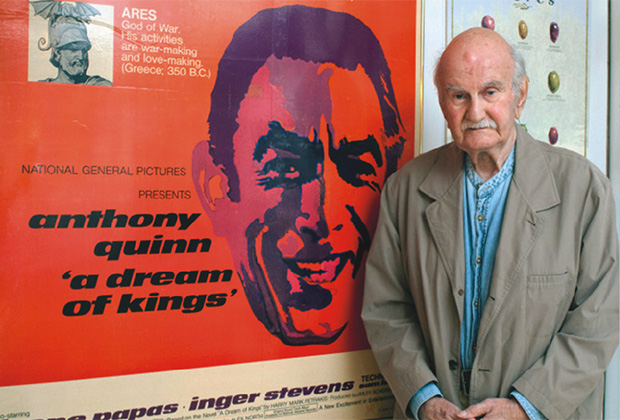Harry Mark Petrakis: A retrospective at 91
by Tina Sfondeles
At 91, Greek-American author Harry Mark Petrakis still lives and breathes Chicago.
It’s the city’s South Side where he watched his father, a Greek-Orthodox priest, help immigrants find faith while struggling to start a life and make ends meet in America. And in the South Loop, where he opened a short-lived restaurant that inspired his creative nature.

Author Harry Mark Petrakis at his home in Chesterton, Indiana. Michael Gard/For Sun-Times Media
The faces he saw, the struggles of immigrants and the stories he heard inspired the characters he’d create in short stories and novels in a career that has spanned decades.
“We had as many as a dozen hobos who would sit and tell marvelous stories. I’d be sitting and listening to their stories,” Petrakis said. “I suspect some were great liars. The girl whose boyfriend had left her and she was on her way to Chicago to kill him and his girlfriend. I didn’t believe her, but these were wonderful stories, and I learned from them.”
Petrakis speaks the way he writes, full of colorful and eloquent words, like he’s writing the story of his life. Earlier this month, he traveled from his home in Chesterton, Indiana, to Chicago’s National Hellenic Museum to receive the Fuller Lifetime Achievement Award from the Chicago Literary Hall of Fame.
His son John, a screenwriting teacher at the School of the Art Institute and the University of Chicago, introduced him. Petrakis became so overcome with emotion by his son’s words that he had to pause before beginning his speech.
“Many families have credos, words they live by, such as ‘when the going gets tough, the tough gets going,’ or ‘every journey begins with the first step.’ The Petrakis family credo, my father once said, is ‘Nobody suffers in silence.’ How could we possibly be mute when there are so many wonderful words out there to describe the way that life has thrown us curves, brushed us back or plunked us right in the back,” his son said.
‘When I began to write about Greeks … that’s the story that sold’ Petrakis was raised in what he calls a Greek-Jewish-Italian immigrant community in the South Side Washington Park neighborhood, then moved to Woodlawn and finally to South Shore.
“The church [Sts. Constantine and Helen] was full of immigrants. They were thrown in between two worlds. I admired them and at the same time feared them. I reviled them for the prejudice even I could see at a young age. Prejudice wasn’t justice. A Greek boy on our block married a Jewish girl and his father put his clothes out in the back and burned them,” Petrakis said.
He first tried to write about things he didn’t know, then found what stuck.
“I wrote of gangsters I knew nothing about. I wrote of cowboys I knew nothing about. But when I began to write about Greeks in the community — the story called “Pericles on 35th Street” about an old Greek hot dog vendor imbued with a sense of the greatness of the Greek past — that’s the story that sold.”
He wrote the novel “The Odyssey of Kostas Volakis” in 1963, telling the story of a Greek man in a new world. Other stories inspired by the plight of Greeks included his bestselling “A Dream of Kings” and “Nick the Greek.”
“I never thought of myself as an ethnic writer because when you write about that which you know, there is your beginning where you cross a certain threshold and you enter the areas of love, sadness, sorrow, anger, revulsion. These are universal. You take which is yours as the beginning and you move into the universal areas,” Petrakis said.
Petrakis remembers the first public critique of his writing, at a broadcasting class at Columbia College Chicago. His assignment was to write a one-page story, the theme being Christmas.
His classmates praised and critiqued each student after the story was read. Petrakis’ tale was about a waiter, and he remembers it as if it just happened.
“He comes home on Christmas Eve and his wife is gone. He knows where she is. She’s hanging out at a nearby bar. He goes out and gets there. She’s sitting at a bar with men, drinking. He takes her home. He slaps her out of anger, then feeling remorseful, he washes her up and puts her to bed, takes out the Christmas tree. It’s a small one he brought home knowing in the morning, she would be sober and they’d decorate the tree.”
“I read that one-page story and in the end, instead of the class chiming in, nobody spoke. I thought ‘It must be god-awful. Nobody wants to say anything.’ ”
The teacher egged on her class asking why no one had spoken.
“One boy said ‘I can’t talk to this story. It’s so obviously written from real experience,’ ” Petrakis said. “They wouldn’t believe that I wasn’t the waiter with the drunken wife.”
It was snowing, and Petrakis took a walk though Grant Park. He realized he had something in that story: “Writing is what I should be doing,” he said.
From there came a mix of acceptance and rejections from various publications. It took him three years to get published.
His father, the Rev. Mark Petrakis, encouraged his writing.
“He died [in 1951] before I sold anything, but he kept a manuscript of my early story in his desk,” Petrakis said. “The secretary there was a wonderful lady named Bessie Spirides. When I came to the office to visit, she pulled out that story. He would tell people ‘My son wrote this. He’s going to be a good writer someday.’ That’s based not on my story. It was based on love.”
Reprinted from the Chicago Sun-Times











0 comments